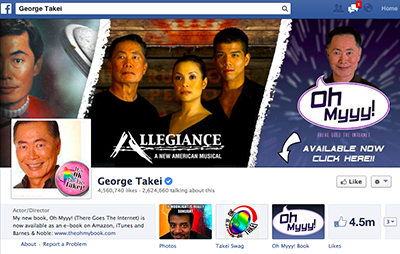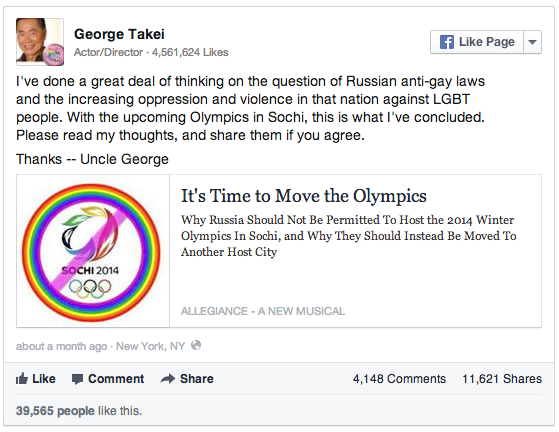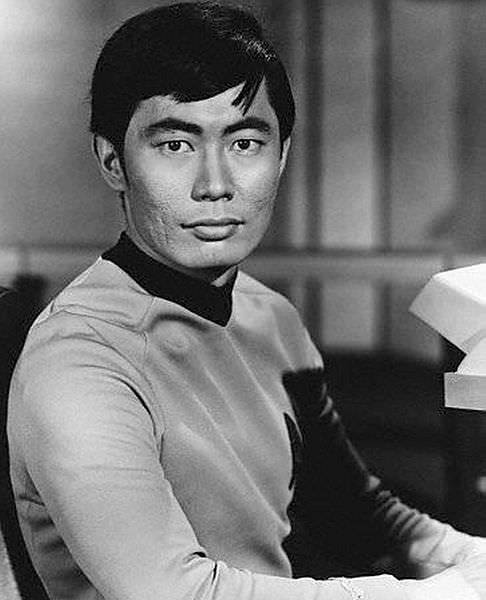
George Takei has a cold. But even a bad cold can’t keep a good Starfleet officer down. And it certainly wasn’t going to stifle Star Trek’s “Hikaru Sulu,” a New York Times Top 10 bestselling author, gay rights activist and social media juggernaut.
I caught up with Takei and his trademark baritone voice—which was a little extra deep this time—via phone to chat about his latest project, “Takei’s Take,” a new YouTube series debuting today. But the Web program wasn’t the only thing on the menu.
With a career that spans generations, the actor, 76, has a second life as a bona fide social media celebrity. Here, he shares a few thoughts about what it takes to succeed on the Web, what propels his real-world and online activism, and how he sees modern technologies and initiatives like Google Glass and SpaceX.
ReadWrite: Congratulations on the success of your book [“Oh Myyy! (There Goes The Internet)“]. It seems people are interested in your journey in the online world. Currently, you have 4.5 million Facebook followers, and more than 800,000 Twitter followers. So what is the key to building such immense online popularity?

George Takei: My base when I started out was sci-fi geeks and nerds, so I had to develop that. I began by talking about science and science fiction, and put in some humorous things. And I solidified the base.
Actually, the reason I began my social media program was this: We developed a musical for Broadway on the internment of Japanese-Americans—a still too-little-known chapter of American history. [Takei himself was subject to an internment camp as a child during World War II.] So we had to raise the awareness of that unconstitutional experience, introduce people to the musical, and then persuade them to want to see it and buy tickets for it. Sci-fi geeks and nerds are not necessarily a theatre-going audience.
What’s important here is the engagement level. And that’s what I concentrated on by humorous means. You catch more flies with honey. — George Takei
So I did the sci-fi geeks and nerds. And I started talking about LGBT (lesbian, gay, bisexual, transgender) issues. It seems there’s a great overlap between the sci-fi geeks and nerds and the LGBT community, and it just exploded. Then I started talking about the internment, the subject of our musical.
What’s important here is the engagement level. And that’s what I concentrated on by humorous means. You catch more flies with honey. Having content that stimulates or amuses or galvanizes, that has been my approach. I think it has proved to be quite successful.
RW: But you’ve never shied away from stirring things up. There was the Christine Quinn episode [the lesbian NYC mayoral candidate endorsed by Takei]. You’re also very outspoken online about the Olympics being held in Russia. Have you ever felt like, “No, I can’t talk about this or that. My fans may not like it.”
GT: But they do like it. They like the combination of the humor and the serious subjects. I just got back from a Star Trek convention in Montreal, and when I talked about the Winter Olympics in Sochi, Russia, there was tremendous applause and support for our pulling it out of Russia and not allowing Vladimir Putin [the Russian President] to have that international stage.
We need to learn from history. In 1936, the IOC [International Olympic Committee] granted Germany the Summer Olympics. Three years before that, Hitler came to power. And he passed what seemed like, in the whole larger context, an innocuous law saying Jewish professors will not be given tenure. Then he had the Olympic stage, and his power and influence and stature grew.
That’s precisely what we’re doing here with Putin. There’s high unemployment amongst young people in Russia and he needs to have a scapegoat. So he passed that homophobic law, which essentially gives license to the thugs and hoodlums to assault anyone they perceive to be gay or lesbian. They accost them, humiliate them, beat them, sometimes so severely, they’re killed. It would be highly irresponsible for the IOC to put the Olympics there.
But the IOC had their meeting last weekend in Buenos Aires, and it seems like they’re completely spineless. Of course, it’s only six or seven months away, but they could postpone it. The next stage of our campaign is to have Russian athletes not be eligible to compete in the Olympics.
We feel very strongly about that.

RW: You have quite a platform to speak from. And, to switch gears a bit, now you have YouTube.
GT: Yes.
RW: So how did this deal for the Web series come about?
GT: The AARP (American Association of Retired Persons) came to me. The idea of social media is to introduce people to new experiences and enrich their lives with these experiences. The AARP demographic is active in social media. But I found that their children and grandchildren are Star Trek fans, and so I told AARP that we could reach a wide demographic of people. Not just the 50-plus, but those in the middle-age sector and also teenagers. So we decided to go ahead with this project, “Takei’s Take.”
RW: What types of things can we expect to see in this programming?

GT: Well, I’m learning a great deal too. Google Glass, for example… I have a little fun with it. It’s not the prettiest looking thing. And I think it has some… I wouldn’t say downsides, but “signs of concern.” If somebody has Google Glass on, they have some face identification capabilities. They could Google you. Then you feel ugly and naked riding in the subway.
And the other thing about that is, they’re $1,500. And there you have it on your face, riding in the subway. When you come into the station, someone can just snatch it, and there you are, minus the $1,500. So there are these kinks to work out. But I think it’s an interesting, fascinating area.
There’s also the sharing economy, where the Internet is used to share a room in your house or your bike that’s not being used. Or your car. Heh, some people are even sharing party leftovers. So there are a lot of interesting and amusing and sometimes eye-opening things happening in this brave, new world. And I think seniors as well as middle-aged people would be interested in that.
RW: What’s your take on technology and today’s middle-agers and seniors? Has technology helped them or failed them?
GT: Well, some have a phobia about it. My sister’s a retired schoolteacher, and she doesn’t even own a computer. I’ve been after her to do that, so we can communicate much more efficiently. She does have a cell phone. But with “Takei’s Take,” we can open up possibilities that enrich lives. And that’s my mission with YouTube.
RW: What is it like for you, being part of the Star Trek universe, and now seeing these fantasy technologies coming to reality?

GT: It’s my belief, and certainly that of Gene Roddenberry, who created Star Trek, [that] it’s the “imagineers” who set the goal for the future. Like a telephone with no cords attached. If it can be imagined, then the innovators, inventors and entrepreneurs will set that as a goal and eventually realize that.
Something like what we had back on Star Trek called the Communicator. But [today’s phone] does much more than what our Communicators did. It takes pictures. You can play games with it, and watch a show with it. And in many ways, it’s also become a real nuisance in our lives.
But it’s the imagineers who set the goal. For example, Elon Musk, who started up PayPal and the Tesla all-electric automobile, started up SpaceX now that NASA is winding down. Private enterprise is providing the space shuttle! He used the phrase, “Humans are the only multiple planet species.” What an amazing thought, and he’s thought it. And that becomes a goal. Elon Musk has talked about colonies on Mars and elsewhere, where our explorations might find that life is sustainable on those planets. So they think the impossible, and it becomes ultimately reality.
The fact that we have the Internet is amazing. So we’re using that to share more information with people.
Takei’s Take, produced by AARP and hosted by George Takei, debuts today and runs bi-weekly.
Feature and YouTube promo image courtesy of AARP/George Takei. Star Trek image courtesy of Wikipedia.
















